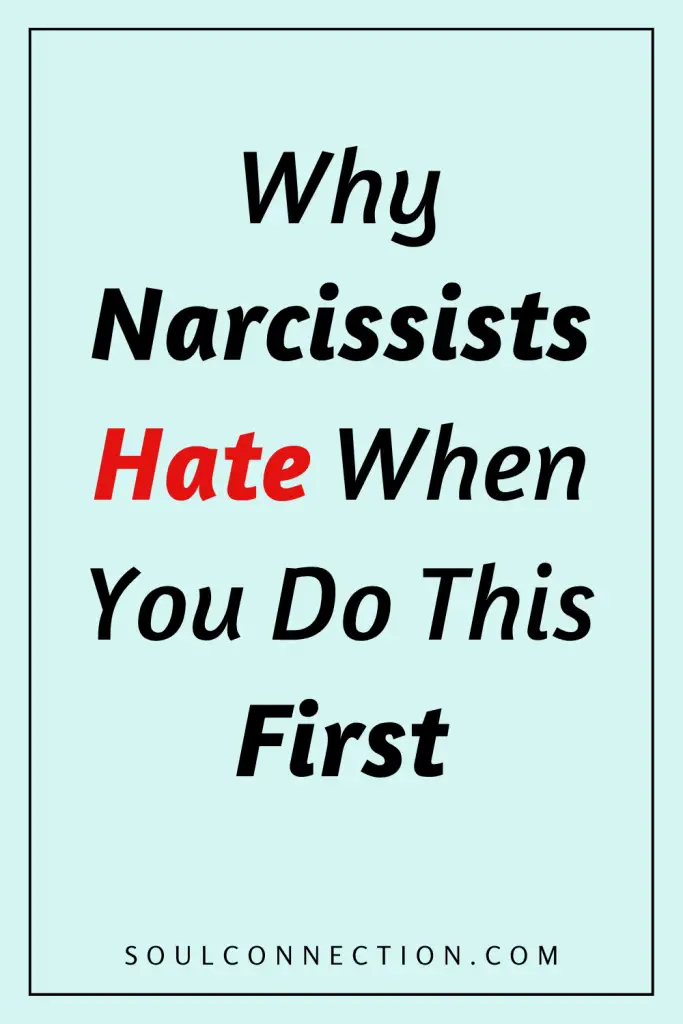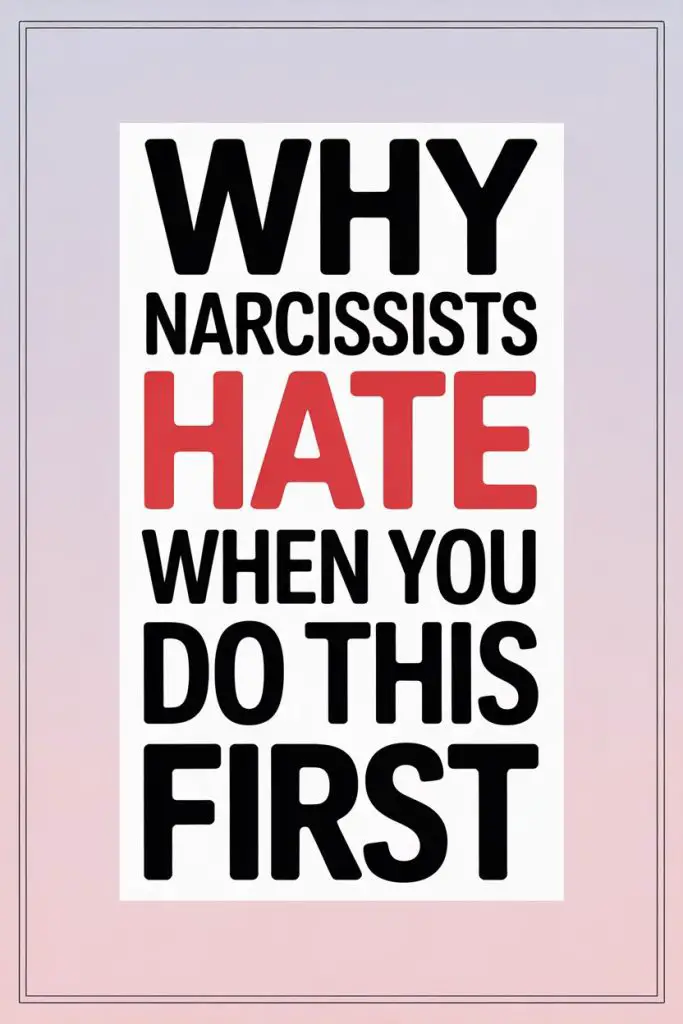Ever noticed how a narcissist’s smile tightens when you show signs of independence? There’s a reason for that.
Narcissists aren’t just allergic to criticism or accountability—they’re also deeply rattled when you act before they can lay down the law. One move in particular rankles them more than almost anything else: when you put yourself first.
Now, before you start feeling guilty for prioritizing your own needs, let’s get something straight.
Caring for yourself isn’t selfish. It’s essential, especially when tangled up with someone who prefers your world to revolve around their every whim.
Let’s dig into why putting yourself first gets under a narcissist’s skin—and how it can change your relationship dynamic (and your peace of mind) for the better.
The Narcissist’s Need for Control
For narcissists, control is as necessary as air. They have an uncanny knack for twisting situations so you feel like their happiness, comfort, or contentment is your responsibility.
The moment you act on your own behalf—whether it’s booking a solo holiday or even just saying “no” to a request—the illusion starts to slip. Suddenly, they’re not the center of your universe, and that’s a blow to their fragile sense of self-importance.
Expect the pushback. Watch for those classic guilt trips, cold shoulders, or the dramatic sigh worthy of a soap opera. Why? Because when you act first, you seize the narrative. You set the agenda.
And nothing sends a narcissist into a tailspin quite like losing their grip on the script.
The Perceived Threat of Independence
Narcissists rely on your dependence. When you act independently, you’re essentially announcing, “I can manage my own happiness.”
That’s not just inconvenient for them—it’s threatening. The idea that you might not need them (or their approval) chips away at their sense of control.
Suddenly, you’re not a guaranteed audience for their grand performances. You become someone with boundaries and a life outside their bubble.
This can feel like sabotage to a person who thrives on being the focal point. Independence, in their eyes, isn’t an attractive quality; it’s a mutiny.
Shifting the Attention
A narcissist’s ideal world is one where every spotlight is trained on them. Your decision to prioritize your own needs pulls the lighting in a different direction, leaving them in the shadows.
It’s not just about you making plans without them—it’s about you reclaiming emotional real estate.
Don’t be surprised when they ramp up the theatrics, try to outshine you, or even attempt to undermine your plans. Narcissists will do almost anything to yank the focus back onto themselves, whether that means stirring up drama or playing the victim.
Suddenly, your quiet evening with friends becomes an affront worthy of the royal treatment—cue the “How could you do this to me?” routine.
Boundary-Busting Behavior
Healthy relationships have boundaries. With a narcissist, boundaries aren’t just ignored—they’re bulldozed.
When you put yourself first, you’re essentially building a fence around what matters to you. That fence is their least favorite decor item.
Pushback is nearly guaranteed. Expect arguments, emotional manipulation, or grand declarations about your supposed selfishness.
This isn’t about you being unreasonable; it’s about the narcissist’s desperate attempt to keep their access to your time, energy, and attention unchallenged.
The Myth of Selfishness
Ever been told you’re selfish for making a decision that benefits you? Classic narcissist move. They’re masters at flipping the script, turning your self-care into an act of betrayal.
If you’re struggling with guilt, remember: real selfishness is demanding everyone else’s life revolve around yours.
Ironically, narcissists are often the least self-aware people in the room. What they call selfishness in you is just projection—a way of avoiding their own uncomfortable truths.
It’s perfectly acceptable to put your needs on the table, especially when you’re sharing that table with someone who usually hogs all the chairs.
Gaslighting Tactics in Action
Putting yourself first can trigger a barrage of gaslighting. Suddenly, the narrative shifts: You’re “overreacting,” “forgetting what’s important,” or “making things up.”
Gaslighting isn’t just about confusion—it’s about making you question your right to set the agenda for your own life.
Stay alert for these tactics. Document your decisions, talk to friends, and trust your own recollection of events. Narcissists thrive on confusion. Your clarity is their kryptonite.
The Power Struggle
Every relationship has its own balance of give and take. With a narcissist, the scales are permanently tipped in their favor—until you do something radical, like put yourself first. That’s when the power struggle erupts.
Instead of letting them dictate every outcome, your independent action signals that you’re no longer a passive participant. You’re steering your own ship, and they’re just along for the ride (if you decide to let them stay on board).
This shift can be uncomfortable at first, but it’s often the first step toward a healthier dynamic.
Practical Ways to Put Yourself First (Without World War III)
Sticking up for yourself doesn’t have to mean constant drama. Here are some ideas to reclaim your autonomy without lighting the relationship on fire:
- Make plans with friends or family that don’t include your partner.
- Say “no” when you’re stretched too thin, without apologizing for it.
- Schedule time for your own hobbies and interests (and keep that time sacred).
- Communicate your needs clearly and calmly—no need for a grand announcement, just a simple statement.
- Seek support from others who understand what you’re experiencing.
Consistency is key. The first time might send shockwaves through your relationship, but the more you practice, the easier it becomes.
Expecting the Backlash—And Surviving It
Narcissists rarely go quietly when their routine is disrupted. Expect arguments, silent treatments, or even grand gestures aimed at winning you back to “their side.”
It’s tempting to fold for the sake of peace, but short-term harmony often leads to long-term resentment.
Holding your ground is tough—especially when guilt creeps in. Remind yourself that your needs are valid, and that uncomfortable conversations are sometimes the price of real growth.
If you’re constantly sacrificing your own well-being, the relationship isn’t really a partnership at all.
Tiny Shifts, Big Results
You don’t need to stage a dramatic intervention to change your relationship with a narcissist. Small, consistent acts of self-prioritization are surprisingly disruptive to unhealthy dynamics.
Each time you choose yourself, you remind both yourself and your partner that your life is not up for negotiation.
Start small. Skip the guilt. Your autonomy isn’t just a luxury—it’s a necessity. And while it might make the narcissist in your life grumble, it gives you the breathing room you need to thrive.
Moving Forward With Your Needs in Mind
Putting yourself first isn’t a declaration of war—it’s a declaration of self-worth. Narcissists hate it because it threatens the fragile bubble they work so hard to maintain.
But your peace of mind? That’s worth all the side-eye and dramatic sighs in the world.
Keep prioritizing your needs, even when it’s uncomfortable. You’ll discover that the more you do, the less power anyone—narcissist or not—has over your happiness.
And in that, you’ll find a freedom no one can take away.


